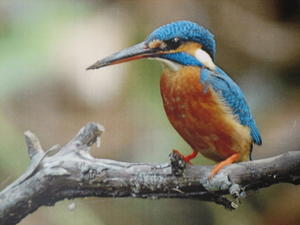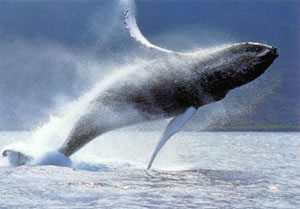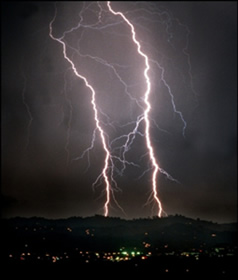
|
The Poetry of Creation
For Sunday May 18, 2008
Lectionary Readings (Revised Common Lectionary, Year A)
Genesis 1:1–2:4a
Psalm 8
2 Corinthians 13:11–13
Matthew 28:16–20
 |
Kingfisher bird. |
On humanity's first trip to and orbit around the moon, on Christmas Eve 1968, the three Apollo 8 astronauts, Frank Borman, Bill Anders and Jim Lovell, celebrated the remarkable scientific achievement by reading some ancient religious poetry. Even though the poetry was 3,000 years old, it was familiar to almost everyone.
The astronauts read ten verses from the lectionary for this week, beginning with the first sentence of the Bible: "In the beginning God created the heavens and the earth." I was thirteen years old at the time, and I still remember the emotional resonance of those elegant words as people around the world watched the grainy television images and listened to the crackly radio transmissions with their intermittent NASA beeps. Planet earth never looked so beautiful, so mysterious, and so very fragile.
The exquisite poetry of Genesis, so fundamental to any view of reality that claims to be Christian, has been dismissed by critics and distorted by believers. In one of the debates before Pennsylvania's presidential primary, for example, the moderator asked Barack Obama if the world was created in six days. That was a journalistic cheap shot, in my opinion, but it reflected how some Christians read the creation story. That's like asking why a painting by Picasso or William Blake isn't more "realistic."
The creation poetry doesn't enlighten us about history, cosmology, or science as we understand those disciplines today. They never intended to do that, and even if that was their intent, their science and history would have been outmoded shortly after the author wrote. Just like our own science of fifty years ago seems outmoded today — and how rudimentary today's science will look in 3,000 years (about the age of the Genesis poetry).
Instead of cosmological conjecture, the Hebrew creation poetry elucidates truths that transcend and even undergird science and history. Some people call these transcendent truths "myths," which is fine, as along as you avoid the inference that a religious myth is false whereas a scientific fact is "true." GK Chesterton rightly observed that “fairy tales are more than true: not because they tell us that dragons exist, but because they tell us that dragons can be beaten.” Marcus Borg thus refers to the "surplus of meaning" in a religious myth.
The Genesis poetry subverts our own creation myths. We have numerous creation myths today, many of which try to claim the prestige of science. In his book The Soul of Christianity (2005) the Berkeley professor Huston Smith characterizes these myths as "scientistic." That is, they suggest that science is the only or the best source of reliable knowledge, and the only type of knowledge worth knowing. But who would want a world reduced to the equations of chemistry and devoid of the beauty of a symphony? Reductionistic "scientism," Smith argues, has been "disastrous for the human spirit."
 |
The astrophysicist Carl Sagan (1934–1996), for example, was famous for his grave intonation on his show Cosmos that the universe is all there ever has been, is, or ever will be. That's a fascinating myth that deserves genuine debate, but it's neither scientifically verifiable or religiously satisfying. The Genesis poet proclaims that there's more to our world than just matter and energy, more than purposeless fate. It says that we're not alone, that we're not abandoned to our own selves, but that ever since "the beginning" the Spirit of God has hovered over all existence like a tender mother (Genesis 1:2).
Or again, in his book The Selfish Gene (1976) the outspoken atheist and zoologist Richard Dawkins of Oxford University objects to the idea that the human species deserves any special moral consideration compared with other species. Misguided religious zealots might believe that ancient superstition, says Dawkins, but it "has no proper basis in evolutionary biology." Peter Singer of Princeton similarly considers it a stubborn, dogmatic religious prejudice to believe that humanity enjoys a special place in the cosmos.
The Genesis poet affirms that every single human being is created in the image of God (1:26). The imago Dei isn't something that you can earn by being smarter, wealthier, or more ethical. And no person, for any reason, is ever bereft of the divine likeness. We can distort or enhance God's image by the choices we make, but we can never forfeit the divine signature. Affirming this image of God doesn't place humanity at the center of the universe, as is sometimes charged. Far from it. God alone is at the center of the creation story. Humanity, says the Psalmist, is made "a little lower than the angels" (Psalm 8:5), charged with stewardship and care for "all the earth" (Genesis 1:26).
As if we needed to hear something that we're tempted to forget, the ancient poet repeats a refrain six times, at the end of each day of creation, that when God looked at His handiwork he "saw that it was good" (Genesis 1:4, 10, 12, 18, 21, 25). When God rested from His work, in a seventh and final flourish, the poet ads that God looked at His finished work and declared it "very good" (Genesis 1:31). Christians have been so convinced of the goodness of creation that they've borrowed a technical term from the non-Christian, neo-Platonic philosopher Plotinus (204–270) to define evil as a parasite on good — evil is a privatio boni, that is, a lack, limitation or distortion of something that's fundamentally good.
I like to interpret the ancient poetry of Genesis with the help of the modern poet Gerard Manley Hopkins (1844–1889). In his poem called God's Grandeur (1877), Hopkins considers the grace inherent in God's creation:
The world is charged with the grandeur of God.
It will flame out, like shining from shook foil;
It gathers to a greatness, like the ooze of oil
Crushed. Why do men then now not reck his rod?
Generations have trod, have trod, have trod;
And all is seared with trade; bleared, smeared with toil;
And wears man's smudge and shares man's smell: the soil
Is bare now, nor can foot feel, being shod.
And for all this, nature is never spent;
There lives the dearest freshness deep down things;
And though the last lights off the black West went
Oh, morning, at the brown brink eastward, springs—
Because the Holy Ghost over the bent
World broods with warm breast and with ah! bright wings.
 |
Hopkins says that creation is "charged" with a flash of lightening or an electric shock, it's like the reflective power of crumpled foil. The world overflows with the abundance of oil, as when you squeeze an olive. But, Hopkins admits, humanity fails to take notice. And even though the monotony of work and the "blears and smears" of economic degradation separate us from the natural environment, "for all this, nature is never spent." There's a regenerative and renewing power in creation's "dearest freshness deep down things." Like the eastern dawn that overtakes the western darkness, like a mother's warm breast, the Spirit of God still "broods with bright wings" to sustain and preserve what was created in the beginning.
For further reflection
* Reflect on Hopkins's other creation poem, As Kingfishers Catch Fire:
As kingfishers catch fire, dragonflies dráw fláme;
As tumbled over rim in roundy wells
Stones ring; like each tucked string tells, each hung bell's
Bow swung finds tongue to fling out broad its name;
Each mortal thing does one thing and the same:
Deals out that being indoors each one dwells;
Selves—goes itself; myself it speaks and spells,
Crying Whát I do is me: for that I came.
Í say móre: the just man justices;
Kéeps gráce: thát keeps all his goings graces;
Acts in God's eye what in God's eye he is—
Chríst—for Christ plays in ten thousand places,
Lovely in limbs, and lovely in eyes not his
To the Father through the features of men's faces.
Image credits: (1) TravelBlog.org; (2) Tom Barefoot's Tours (Hawaii); and (3) Pictopia.com.





